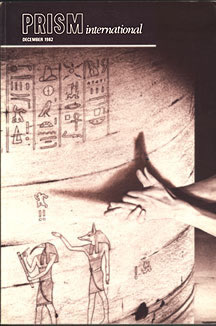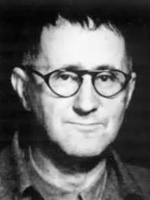Sound Film: Kuhle Wampe
or Who Owns the World?Bertolt Brecht
Translated from the German by E. J. Campfield
In the summer of 1931, by taking advantage of especially propitious circumstances (the dissolving of a film company, willingness of an unnamed individual to invest a modest sum of money together with his theatrical abilities in a film, etc.), we had the opportunity to produce a short film. With the impression left by the Three Penny Opera case fresh in our minds, we drew up a contract which, for the first time in the history of motion pictures we are told, made us legally both the producers and the authors of the film. Though this cost us our claim to the usual guaranteed fee payments, it secured for us almost unlimited control over our work.Our small company consisted of two screenwriters, a director, a musical scorewriter, a production manager and, last but not least, an attorney. Understandably, organizing the company and planning the details put us to much more trouble than the artistic work itself, that is to say, we came more and more to regard the organizing as being a significant aspect of the artistic work. That was only possible because the nature of the work was as a whole political.
Yet, at the last moment before completion of all work in progress with nearly nineteen-twentieths of the film shot and considerable funds used up, our credit was withdrawn. A firm that had loaned us money and which had a monopoly on certain equipment that we needed explained to us that it no longer had any interest in the release of our film and was canceling funds which had been promised to make further work on it possible. They claimed that though the film might be highly lauded by the press, the press did not reflect the opinions of the paying public, and that the film could not possibly turn a profit, in as much as communism no longer posed any danger for Germany.
Other firms refused to extend credit because they feared censorship of the film, not so much government censorship, though, as censorship by the theater owners themselves. Indeed the former is just the mouthpiece of the latter, and the government censors generally don't act just as an impartial third party, but rather as executors of the wishes of the existing administration and economic system.
DESCRIPTION OF THE FILM
The sound film Kuhle Wampe or Who Owns the World? consists of four self-sufficient sequences which are separated by musical pieces which accompany montages of tenaments, factories and landscapes. The first sequence, based on a true event, shows the suicide of a young man out of work during the best years of his life. His troubles have accumulated layer by layer until, on top of all this, the final unbearable misery is laid: the young man's unemployment benefit is canceled. Before hurling himself out of a window, the aforementioned young man takes off his wrist watch and lays it aside so that it will not be broken. The beginning of this sequence in the film shows the search for work as work itself.
The second sequence shows the eviction of the family as the result of a court judgment (which refers to the unfortunate family's inability to keep up its rent as being "brought about through their own fault.")
The family moves out of the city to a tent colony called Kuhle Wampe and takes shelter in the tent of their daughter's boyfriend. (The film was for some time supposed to have been titled Ante Portas.) The daughter becomes pregnant, and because of the narrow-minded attitudes about relations prevalent with those in the colony, (a type of "possession" of land and property plus the acquisition of a little income create peculiar social forms) the young couple is pressured into an engagement. It is the daughter's decision, though, to break off the engagement.
In the third sequence, a workers' Sports Rally is shown. The rally is well attended and excellently organized. It's purpose is thoroughly political; the recreation and competition of the masses is merely a symbol for revolutionary activity. In this sequence, over 300 worker-athletes were involved. The young couple from the second sequence are shown among the athletes and the workers: the girl has, with the help of her girlfriends, raised the money for an abortion, and the couple have put aside all thoughts of marriage.
The fourth sequence shows the trip home from the rally in a railroad car in which takes place a discussion over a newspaper article which tells of the destruction of Brazilian coffee for the purpose of price-fixing.
CONCERNING THE POETRY
The "Song of the Homeless" was omitted because of apprehension over censorship, and "Roll Call" because of technical problems.
The "Solidarity Song" was sung by some 3000 worker-athletes. The "Sporting Song" was sung by a soloist during the motorcycle and boat races.
The poem "On Nature in the Spring," done in solo voice, accompanies and connects three walks taken by the young lovers. During production, this part of the film was screened for worker-athletes who objected to the nudity in it.
Brecht, Dudow, Hollering,
Kaspar, Ottwald, Scharfenberg
Translation copyright ©1980, 2003 by E. J. Campfield. All rights reserved.

Sound Film: Kuhle Wampe
or Who Owns the World?
appears here as originally published in
PRISM
INTERNATIONAL
Volume 21 · Number 2 · Winter 1982
The University of British Columbia
Vancouver, B.C.
